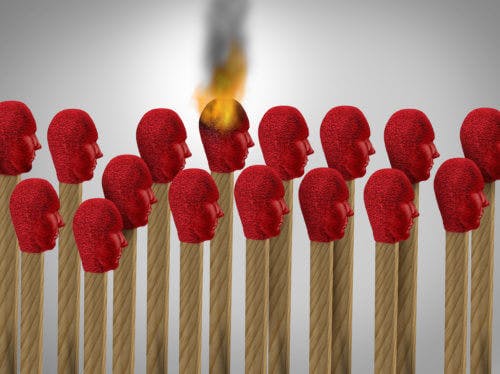- Home
- Resources
- Depression
- Article
Inflammation and Depression: The Clear Connections

There’s the clinical view of depression, and then there’s the real-world, full picture of it. Depression is both emotional AND physical. And these two parts play off each other in an ever-shifting feedback loop, moderated by inflammation.
The emotional part of depression involves how you’re raised, your natural emotional disposition (aka temperament), and the rest of your life experiences. These factors, in turn, shape a lot of the rest of your life: the way you see the world, the types of relationships you keep, how you eat, sleep, and move through the world.
All of the above influence the feedback your brain receives from the world, which further shapes the brain through physiological pathways. One of the most impactful ways your world shapes your brain, and state of depression, is through inflammation.
Inflammation has been shown to contribute to depression through a number of pathways. It’s a complex web, but we break it down, below.
Why Inflammation Contributes To Depression: A Mystery, Solved?
Inflammation in the body directly influences the activity of nerves and your nervous system. But this seems like a random connection – why would these two body systems have anything to do with each other?
Inflammation’s Evolutionary Role
A puzzle piece: researchers have found that the genes most predictive of depression “have pro-inflammatory and/or anti-pathogen protective effects or have been implicated in social behaviours that are likely to reduce pathogen exposure.”
In essence, the genes that best predict depression also make us good at staying healthy. They predict a stronger inflammatory response to infections, as well as social behaviors that keep us from getting sick. Again, what’s the connection?
It seems that the immune system creates inflammation to fight off infections or dangerous microorganisms, but also has a side effect: inducing depression symptoms to keep us from getting further infected.
How Depression Symptoms Kept Our Ancestors Healthy
How could depression symptoms possibly have helped our ancestors stay alive?
Let’s use an example to illustrate why depressive behaviors improved our survival, way back when:
In the past, we humans were more likely to die of infections. Because infections are spread most easily by human to human contact, our immune systems developed a direct stake in our social lives (which are controlled by the nervous system).
If we were around people more, we’d get infections more often, which would create more inflammation in our bodies (fighting the bacteria or fungi that put our lives at risk). Since inflammation indicates to our bodies that we’re infected, our immune systems developed a way of keeping us from even further infection: making us want to stay away from other people.
Researchers show that the avoidant, fatigued, and hypervigilant components of depression correlate with chronic cytokine exposure. Cytokines are inflammatory messengers of the immune system. They cause inflammation in response not just to infection, but also to social experiences.
This mechanism might have helped our ancestors stay alive during epidemics or in hard times. Explaining another part of the puzzle, it also may have helped our ancestors reproduce.
Inflammation and Fertility: More Female Depression Sufferers
The gender gap in depression was previously unexplained: women are 2x as likely to suffer from depression. Now we may know why.
Inflammation directly influences female fertility – the higher the inflammation, the less fertile one is. Way back, when we were likely to experience extreme inflammation in response to infections, the body may have built in depression in response to inflammation. It would serve as a fertility safety measure.
It may have been helpful to make females withdraw from others during times of infection. This not only gave the body a chance to heal and reduce the risk of further infection – it specifically safeguarded a woman’s fertility, as high, prolonged inflammation can damage reproductive ability.
We’re Already Inflamed Enough
However, we now live in a society where the likelihood of severe infection (and it impacting one’s fertility) are much lower. Now, raging inflammation due to our modern lifestyle may be reducing fertility, itself. It may also contribute to depression’s rise in modern society.
While the immune systems’ control of our social lives was probably helpful for our ancestors, it leaves us feeling crappy and anti-social, in a world where we’re less likely to actually die of low-grade infections.
Today, low-level inflammation can throw us into a depression hole — even when we want desperately to connect. Discuss this new idea, or your individual struggle with inflammatory depression, at Supportiv. It’s anonymous and instant. The perfect way to cope with depression and get your human connection, without spiking stress hormones.
Contact Us
For anonymous peer-to-peer support, try a chat.
For organizations, use this form or email us at info@supportiv.com. Our team will be happy to assist you!

